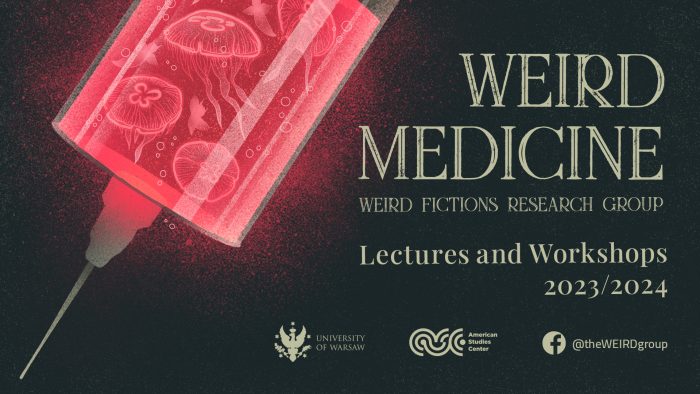Join Weird Fictions Research Group for the second lecture in the Weird Medicine series!
The meeting will be held online.
Laura Kremmel
(Niagara University)
Scared Sick: Medicine and the Gothic Tradition
Thursday, November 9, 2023
5.30PM
You can get 2 OZN points for participating in this event.

Where?
This lecture will be streamed online. To attend, join via Zoom or paste the link into your browser: https://uw-edu-pl.zoom.us/j/95915693010
What?
Fear, uncertainty, and unease have been vital in shaping actions and attitudes towards health and healthcare both today and throughout the history of the Gothic as a literary tradition. It reflects and articulates those fears by providing a shared language and imagery to express and explore anxieties about our most important assets: our bodies and minds. This talk will be grounded in the foundational Romantic period and will explain ways in which Gothic works reflected some of the most controversial medical pursuits, playing out their possibilities and dangers. At the same time, medical writings and theories drew on Gothic images and aesthetics to develop understandings amongst both fellow professionals and public patrons.
This talk will also address the pandemic and the ways in which the Gothic and horror reflected and addressed our most recent fears. When the media shows us casualty numbers, horror confronts us with bodies. When contagion causes us to fear each other, it helps us to understand why. When isolation causes lasting impacts, it reminds of its dangers. Whether considering the medical innovations of today or the past, the Gothic is unafraid to recognize, even value, the darkest corners of the human body and mind.
Who?
Laura Kremmel is an assistant professor in the English Department at Niagara University, where she teaches 18th-and-19th-century British Literature and Gothic Literature. Her work explores the intersections of Gothic Studies, Health Humanities, History of Medicine, Disability Studies, and Death Studies. Her monograph, Romantic Medicine and the Gothic Imagination: Morbid Anatomies, was published in 2022. She has also recently published chapters on Gothic Ecoburial in Dark Scenes from Damaged Earth: The Gothic Anthropocene (2022), on the ambivalent relationship between the Gothic and the Health Humanities in Twentieth-Century Gothic (2022), on contagious disease and fears of altering identity in Evolutions of Horror in the Twenty-First Century (2023), and on literary depictions of disparity and organ harvesting in the Edinburgh Companion to Globalgothic (2023).




